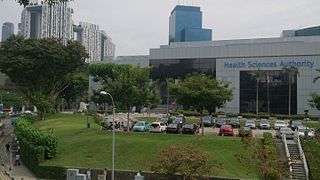
The Nursing and Midwifery Council (NMC) is the regulator for nursing and midwifery professions in the UK. The NMC maintains a register of all nurses, midwives and specialist community public health nurses and nursing associates eligible to practise within the UK. It sets and reviews standards for their education, training, conduct and performance. The NMC also investigates allegations of impaired fitness to practise.
The Royal College of Veterinary Surgeons (RCVS) is the regulatory body for veterinary surgeons in the United Kingdom, established in 1844 by royal charter. It is responsible for monitoring the educational, ethical and clinical standards of the veterinary profession. Anyone wishing to practice as a vet in the United Kingdom must be registered with the RCVS.
The Health and Care Professions Council (HCPC), formerly the Health Professions Council (HPC), is a statutory regulator of over 280,000 professionals from 15 health and care professions in the United Kingdom. The Council reports its main purpose is to protect the public. It does this by setting and maintaining standards of proficiency and conduct for the professions it regulates. Its key functions include approving education and training programmes which health and care professionals must complete before they can register with the HCPC; and maintaining and publishing a Register of health and care providers who meet predetermined professional requirements and standards of practice.
A regulatory agency or independent agency is a government authority that is responsible for exercising autonomous dominion over some area of human activity in a licensing and regulating capacity.
The General Optical Council (GOC) is an organisation in the United Kingdom which maintains a register of opticians and regulates the services provided by dispensing opticians and optometrists. The stated function of the GOC is "to protect the public and promote high standards of professional conduct and education amongst opticians".
The General Dental Council (GDC) is an organisation which regulates dental professionals in the United Kingdom. It keeps an up-to-date register of all qualified dentists and other dental care professionals such as: dental hygienists, dental therapists, dental nurses, dental technicians and clinical dental technicians. It was established in 1956 to set and maintain standards in UK dentistry, with the aims of protecting the general public from unqualified dental professionals.

The General Medical Council (GMC) is a public body that maintains the official register of medical practitioners within the United Kingdom. Its chief responsibility is to "protect, promote and maintain the health and safety of the public" by controlling entry to the register, and suspending or removing members when necessary. It also sets the standards for medical schools in the UK. Membership of the register confers substantial privileges under Part VI of the Medical Act 1983. It is a criminal offence to make a false claim of membership. The GMC is supported by fees paid by its members, and it became a registered charity in 2001.
The Pharmaceutical Society of Northern Ireland (PSNI) is the regulatory and professional body for pharmacy in Northern Ireland.

The Health Sciences Authority (HSA) is a statutory board under the Ministry of Health of the Government of Singapore. It is a multi-disciplinary agency responsible for applying medical, pharmaceutical, and scientific expertise to protect and advance public health and safety.
The General Osteopathic Council (GOsC) is the regulator of the practice of osteopathy in the United Kingdom.
The Complementary and Natural Healthcare Council (CNHC) is a regulatory body in the United Kingdom which provides a voluntary register of complementary, rather than alternative medicine, therapists. The key purpose of CNHC is to act in the public interest and enable proper public accountability of the complementary therapists that it registers.

The General Chiropractic Council (GCC) is an independent statutory body established by Parliament to regulate the chiropractic profession in the United Kingdom. It protects the health and safety of the public by ensuring high standards of practice in the chiropractic profession.
The General Pharmaceutical Council (GPhC) is the body responsible for the independent regulation of the pharmacy profession within England, Scotland and Wales, responsible for the regulation of pharmacists, pharmacy technicians and pharmacy premises. It was created, along with the Royal Pharmaceutical Society, in September 2010 when the previous body responsible for regulation, the Royal Pharmaceutical Society of Great Britain, was split so that representative and regulatory functions of the pharmacy profession could be separated.
The British Acupuncture Council (BAcC) is a self-regulatory body for the practice of traditional acupuncture in the UK.
The Register of Clinical Technologists (RCT) is a voluntary professional register for clinical technologists and practitioners specialising in the practical application of physics, engineering and technology to clinical practice in the UK. Registrants work in NHS hospitals, private health care, academic institutions and the medical device industry.

Caroline Corby is the Chair of the Parole Board for England and Wales and the Chair of the Professional Standards Authority for Health and Social Care.
The Society of Homeopaths (SoH) is a British private limited company formed in 1978 by "a small group of homeopaths who were keen to work together for the development of the profession and to ensure high standards in the practice of homeopathy" and at September 2018 had 997 members on the Society's register who can refer to themselves as RSHoms. The SoH's register was first accredited by the Professional Standards Authority (PSA) in September 2014 allowing members to display the Accredited Register's logo at the time. In January 2021 the PSA suspended the society's accreditation for failure to meet standards the PSA had set.

The National Health Regulatory Authority (NHRA) is an independent regulatory body established in 2010, under Law No. 38 of 2009, of the Kingdom of Bahrain.

The National Health Service Reform and Health Care Professions Act 2002 is an act of the Parliament of the United Kingdom that reorganised the administration of the National Health Service in England and Wales.







